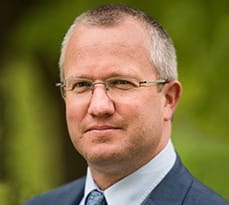If you’d told Professor Jon Timmis five years ago that his career was about to take a turn into entrepreneurship, he’d have laughed in disbelief.


As Head of Electronic Engineering at the north of England’s University of York, with a crowded teaching and research schedule, Jon says he still can’t quite believe that just a few years on, he really is the founder and CEO of software and data modelling specialists SimOmics, responsible for eight employees and with a roster of blue-chip clients.
What’s not so unexpected is that the company grew out of one of Jon’s research interests: modelling immune systems to guide the design and implementation of more efficient processes for experimentation. As their research progressed and the sophistication of their software platform and modelling capabilities grew, Jon and his immunologist collaborators at the University of York, Professor Vipin Kumar and Dr Mark Coles – who became fellow co-founders and now serve respectively on the Board and as Chief Scientific Officer of SimOmics – eventually asked themselves: “Would our software and platform have legs as a spin-out business?”
Enterprising fellows from the Royal Academy of Engineering
Initial feedback from enterprise support colleagues at the University of York was encouraging and the team won some early pump-priming finance from the Wellcome Trust and Medical Research Council through the University’s Centre for Chronic Diseases. Meanwhile, Jon found himself starting his personal entrepreneurial journey with a year-long Enterprise Fellowship from the Royal Academy of Engineering (RAEng). As part of a partnership between that programme and Cambridge Judge Business School, Jon joined other RAEng Enterprise Fellows on the Ignite programme in 2014. The proposed business model met with some criticism from Ignite mentors and experts. “At that stage,” remembers Jon,” we knew that our software and modelling capabilities were cutting edge. What we didn’t know was if people would pay for what we were offering. Ignite answered that question. And it was an emphatic no.”
However, Jon was far from discouraged. That negative reaction proved to be the catalyst that changed the concept into what is now a successful venture. “That first feedback seemed harsh, but honest appraisal is absolutely what a startup wants. I learnt very quickly that there’s a big difference between what we had – at that stage little more than a cool idea – and a truly commercial product that’s the foundation for a sustainable business.” says Jon. “The constructive criticism we got from Ignite mentors and faculty helped me analyse our initial proposition and pinpoint its weaknesses. That was a real light bulb moment for me!’”
Jon worked with his co-founders to translate their original ‘cool idea’ into what he now appreciated could be a scalable product with applications beyond immunology. “We widened our horizons from service-led niche provider and now integrate products and delivery within a licensing business model that’s attractive to clients in diverse sectors from pharmaceuticals to environmental risk assessment. Ignite was a timely and critical test bed that certainly played a role in bringing SimOmics to where we are today.”
Virtual laboratory reduces testing on animals
Three years on SimOmics continues to evolve and has significantly reengineered its value proposition. Increased experimental efficacy and reduced costs are still key, but Jon and the SimOmics team have added an innovative and disruptive component to their offer. SimOmics clients are household names and major players in cosmetics, healthcare, agri-tech and pharmaceuticals. Current regulatory rules mean that many ingredients they plan to include in new or improved products have to be retested for each new formulation. In addition, understandable reluctance to share test data with competitors results in companies across the world repeating tests that have been done many times before and which often use animal subjects. SimOmics’ virtual laboratory software addresses this costly duplication by simulating the impact of drugs on the organs of fish and mice, significantly reducing the numbers of animals required for use in experiments and commercial testing. Meanwhile SimOmics’ platforms extend the company’s offer by aggregating data and reliably modelling experiment parameters without compromising either commercial confidentiality or public safety.
Self-reliant strategy for funding growth
SimOmics has grown organically, with income and some grant funding supporting expansion and developing talent from York’s own rich pool of engineers and scientists. Jon’s traces his active decision to delay seeking outside investors to the Ignite programme: “Ignite taught me that when you go to investors you need the strongest possible proposition. Until now we have felt that giving away equity would have been selling ourselves short. We’re continuing that self-reliant strategy by looking to fund immediate growth through product diversification and additional grant funding. But we’re now in a position where we’re generating positive revenues and an impressive client portfolio. From now on, when we do seek investment, we won’t feel we’re giving away the crown jewels.”
Entrepreneurship and the appliance of science
Jon has combined his new role as entrepreneur and CEO with his full time professorial post at the University of York, where he runs a busy research group. He recognises that his exposure to the harsh realities of the business world has changed his approach to academic research: “My research emphasis was always on applied science, and one transferable lesson was to set up a much more effective development pipeline to move research through from theory to application.” Jon also sees a wider benefit: “My academic group have been aware of SimOmics every step of the way. As a result they’ve seen that it is possible get research out of the lab – to commercialise it – and still hold on to the fundamental science and desire to have an impact that you were so passionate about in the first place.”
Combining science with real-world impact is what’s behind the next step in Jon’s personal entrepreneurial journey. Now SimOmics is on a strong footing, and with day-to-day operations in the hands of CTO Dr Paul Andrews, Jon is taking up a new post as the University of York’s first ever Pro-Vice Chancellor for Partnerships and Knowledge Exchange. Professor Timmis credits Ignite in part with this new twist in his career: “There is an entrepreneurial flavour here, but not enough. Becoming an entrepreneur taught me to understand and exploit commercial potential and this is a great opportunity to share what I’ve learnt by facilitating and encouraging more of that entrepreneurial spirit here at York.”

